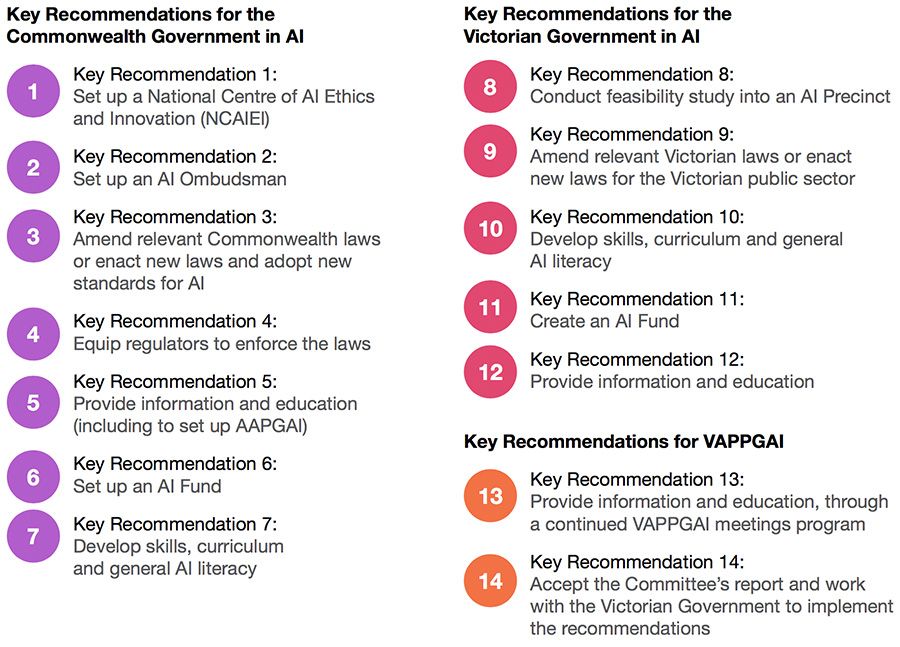
Victoria has significant opportunities to grow into a leading ecosystem for artificial intelligence in Australia, according to a report by the Committee for Melbourne.
The report, titled ‘The future of Artificial Intelligence in Australia’ was released by the Committee for Melbourne’s AI Taskforce, delivered in collaboration with experts from a host of external partners including EY, Deloitte, PwC, Jacobs (the parent of PA Consulting), and Nous Group.
Key focus of the report is to uncover the economic and social benefits that could be achieved from developing artificial intelligence (AI) in Victoria. The study, which was commenced prior to Covid-19, concludes that artificial intelligence can deliver “transformative benefits to economy and society”, with uses cases ranging from better healthcare and government services, to private sector benefits such as enhanced monetisation of customer opportunities and back-office optimisation.
To put the benefits into context, according to a global report by PwC, artificial intelligence could lift the world’s gross domestic product by a mesmerizing 14% by 2030 – potentially adding over $15.7 trillion to the current baseline. Of this, $6.6 trillion is projected to come from increased productivity and $9.1 trillion from consumption-side effects.
Melbourne’s AI Taskforce points out that alongside the economic potential, “an equitable, fair and safe use of artificial intelligence” is key for both society, individuals and uptake of the technology in general. To this end, the report recommends to put into place a range of safeguards and regulatory controls.
A total of fifteen recommendations are made by the AI Taskforce, including the setup of a National Centre of AI Ethics and Innovation, an AI Ombudsman and an AI Fund, while recommending the Victorian Government develop skills, curriculum and general AI literacy and conduct a feasibility study into an AI Precinct.
14 recommendations to advance the AI agenda
Key recommendations for the Commonwealth Government:1: Set up a National Centre of AI Ethics and Innovation (NCAIEI)2: Set up an AI Ombudsman3: Amend relevant Commonwealth laws or enact new laws and adopt new standards for AI4: Equip regulators to enforce the laws5: Provide information and education (including to set up AAPGAI)6: Set up an AI Fund7: Develop skills, curriculum and general AI literacy
Key recommendations for the Victorian Government:8: Conduct feasibility study into an AI Precinct9: Amend relevant Victorian laws or enact new laws for the Victorian public sector10: Develop skills, curriculum and general AI literacy11: Create an AI Fund12: Provide information and education
Key recommendations for the Victorian All-Party Parliamentary Group on AI (VAPPGAI):13: Provide information and education, through a continued VAPPGAI meetings program14: Accept the Committee’s report and work with the Victorian Government to implement the recommendations
Commenting on the action-driven recommendations, Martine Letts, CEO of the Committee for Melbourne, said: “Given the size and scale of the policy considerations, tremendous leadership will be needed to drive the long-term strategic thinking on AI which is so essential to our future economic growth and community wellbeing.”
Representatives from the consulting industry included Rob Hillard, Chief Strategy & Innovation Officer at Deloitte; Gavin Seewooruttun, Asia-Pacific Advisory Leader for Artificial Intelligence (AI) and Analytics at EY; Patrick Hill, Senior Vice President at Jacobs; Matt Kuperholz, Chief Data Scientist at PwC; and Tim Orton, Managing Director at Nous Group.
What is artificial intelligence?
There is no commonly agreed definition of artificial intelligence, but the definition identified by the Australian Government in its AI roadmap titled ‘Artificial Intelligence: Solving problems, growing the economy and improving our quality of life’ is:
“AI may be defined as a collection of interrelated technologies used to solve problems autonomously and perform tasks to achieve defined objectives, in some cases without explicit guidance from a human being. Subfields of AI include machine learning, computer vision, human language technologies, robotics, knowledge representation and other scientific fields. The power of AI comes from a convergence of technologies.”
AI applications can be broadly classified into two categories based on their purpose, enabling augmented intelligence (people and AI working together to enhance cognitive performance) or autonomous intelligence (autonomous systems that operate without requiring a human in the loop).
Source: https://www.consultancy.com.au/news/2915/consulting-firms-support-victorias-vision-for-artificial-intelligence